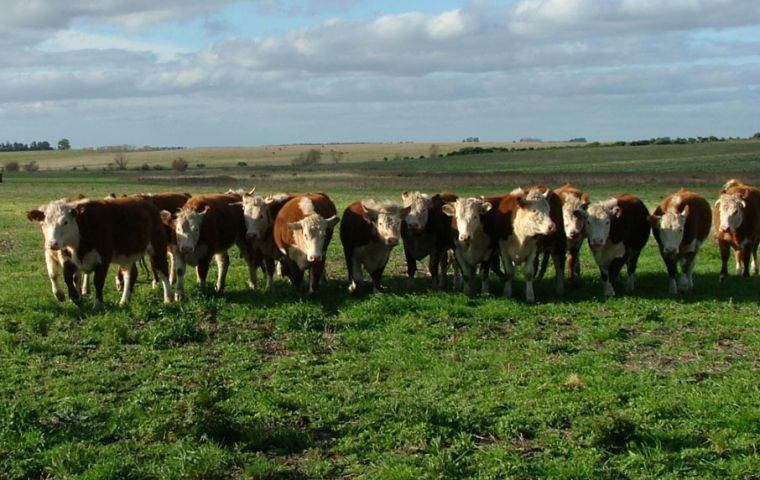MercoPress. South Atlantic News Agency
Hard times, even closure for some Uruguayan abattoirs, anticipated Mujica
 Over extended and shortage of prepared livestock have forced the situation
Over extended and shortage of prepared livestock have forced the situation Uruguayan president Jose Mujica warned that several abattoirs will run into deep trouble and might have to close down because of the lack of livestock ready for slaughtering. He also cautioned that “there is not much more the Executive can do”.
“The abattoir situation in Uruguay is excessively dimensioned: there is far more industry capacity than possibilities of being active”, said President Mujica who added that “I think that at some point too tempting numbers led to an investment rush that is not in accordance with reality, …and I believe some abattoirs will have to close down”.
“I’m not saying this with a pessimistic spirit but rather because we have long history with cattle farming in this country, and these things have happened before”, pointed out Mujica.
Recently the British owned Breeders & Packers abattoir in Durazno and recently opened was forced to send home 70 workers because of the lack of cattle and a similar situation is facing Inaler, belonging to the Brazilian group Marfrig that said it will remain closed down for another two months and personnel in unemployment insurance.
President Mujica said the government had decided “some palliative measures”, but acknowledged “they won’t solve the real problem” and proposed the industry looks into alternatives.
Nevertheless Mujica said that the labour market in Uruguay is “living an interesting moment” and being out of a job in an abattoir does not mean they won’t find work in some other industry”.
Recently the Uruguayan government decreed a more flexible scheme for having access to unemployment pay (less worked hours) and extends the benefit period from six months to twelve months for the meat industry.
Mujica comments follow on news from Moscow that Russian officials have decided to withdraw the export certification of 85 abattoirs in neighbouring Brazil (beginning next June 15), which is expected to have an impact in Uruguay.
Russia is a leading market for Brazilian and Uruguayan beef. However Uruguayan beef operators said that there shouldn’t be many surprises as far “as prices are concerned”.
Operator Gabriel Slinger said that Russia was disappointed with Brazil for trying to reach a bilateral agreement for an extra quota in the Russian market.
Andres Albanell from Sudambeef said the decision was really oriented to lower Russian stocks of beef “without influencing prices in the domestic market”
“With 85 Brazilian plants de-certified and Uruguay with not sufficient cattle there should be no problems with beef prices in Russia” said Albanell.
However this could force Brazil to try sales in other markets forcing international prices down which would also have an impact on Uruguay and local cattle prices.
The official argument from Russia is that a recent sanitary inspection to Brazilian abattoirs showed that several states (Parana, Matto Grosso and Rio Grande do Sul) veterinary services did not comply on time and with the expected rigour with requirements.
“The sanctioned plants have not done in the last three years any inspections to check the presence of mercury, dioxins, insecticides or radio-nucleus in their production”, said Alexei Alexeyenko spokesperson for Russia’s Agriculture Sanitary Inspection Office, quoted by Interfax
Brazil supplies Russia with 35% of the country’s pork imports, 45% of beef and 19% of chicken. However beef shipments from 30.000 tons per month in March and April had dropped to 12.500 in May.




Top Comments
Disclaimer & comment rules-

-

-

Read all commentsTime for Brazil, Chile, Uruguay, Australia, & NZ
Jun 04th, 2011 - 07:22 am 0(and Argentina & Paraguay too - if they can stop jumping at shadows)
to jointly own, manage, and “risk-share”
the beef-production (abattoir & cold storage) industry
in the Southern Hemisphere.
-
US-American & Brit interests are playing us for fools.
-
Their interest ARE NOT our interests.
Lets get a pan-Australasia-Mercosur,
grower-owned, professionally managed,
cooperative, abattoir operating entity (or two)
up and running NOW.
-
It is not 'playing us for fools' to ensure that we conform to standards of inspection and contaminations.
Jun 04th, 2011 - 12:01 pm 0And, as far as the inability to match contracts with supplies - the smaller part of this is down to 'the weather', the larger part to early excess profit taking without reference to the sustainability of the herds to provide the necessary constancy of flows to market.
And the west will say unto you.
Jun 04th, 2011 - 04:53 pm 0Our way- or the highway, your choice
if you have no standards, then you will have no markets ??
Commenting for this story is now closed.
If you have a Facebook account, become a fan and comment on our Facebook Page!